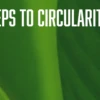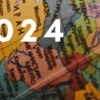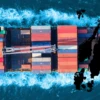By early 2024, new customs management standards will be in place in Belgium and the Netherlands, which will have a major impact on many of Bleckmann’s clients. Fortunately, our Customs department has been working hard to make the transition as smooth as possible. To find out more, we sat down with Evert-Jan Jaspers, Customs Manager for the Netherlands, and Sara Ramos, Customs Manager for Belgium and the United Kingdom. Discover what the changes mean for our clients and how we’re streamlining the customs declaration process – so that nothing stands in the way of an exceptional customer experience.
Alignment with EU’s legal framework
In line with the EU’s legal framework for customs rules and procedures, known as the Union Customs Code (UCC), the law surrounding customs declarations for imports and exports has changed. By Q1 2024, it will be mandatory for all Belgian and Dutch logistic parties to declare goods according to new standards. They will replace the existing electronic declaration system (AGS) and the application that allows customs to excise declarations to be submitted electronically (PLDA systems).
The new declaration framework in the Netherlands is called the ‘Douaneaangiften Management Systeem’, or ‘DMS (4.0 and 4.1)’. The Belgian system for imports is called Import Declaration Management System (IDMS), and the system for exports is called Automated Export System (AES). The DMS system has a hard go-live date of 31 December 2023, while the Belgian systems will go live in early 2024.
A more transparent supply chain
The regulatory update will require importers and exporters to provide much more detailed information about the origin of goods and the journey they took to their destination. This will make it much harder to hide any potentially unethical practices behind opaque supply chains – creating a culture of transparency and traceability across industries.
“Thanks to the update, it will now be possible for customs officials to check a particular SKU in one of our warehouses and see its point of origin – all the way back to the original seller,” explains Sara Ramos. “It’s a more comprehensive approach to customs management, involving much more detailed data collection, more regular checks, and a new IT framework.”
Ensuring future-proof compliance
“Our top priority in the Customs department is to ensure that our clients’ products keep reaching their destination with the minimum of fuss, so we had to prepare well,” explains Sara. “We set up a cross-departmental working group to coordinate our activities. This included the Executive Committee, the IT and Transport departments, and the regional COOs and cluster directors. We’ve all been working hard for months to create an integrated data exchange framework that allows for streamlined compliance with the new DMS regulations.”
The new framework is currently being rolled out to all Bleckmann clients to ensure that everyone is ready for the 2024 compliance deadline. “Over the past few months, we’ve held a series of workshops with site managers and office teams at all relevant locations.” continues Evert-Jan. “The aim is to educate everyone on how Bleckmann can help clients adapt to the new regulations and thrive. We’ve also been collaborating closely with our clients’ operations and IT teams to help them prepare for the change, and we’ve thoroughly tested all our systems and workflows to ensure minimal disruption.”
Simple, digital, integrated
Bleckmann’s declaration management system is integrated with our warehouse management system (WMS). This ensures that every product that passes through our warehouses has all the correct paperwork, minimising delays and streamlining the compliance process. The digital format also makes it simple to share key documents with EU customs authorities.
“One of the most important documents for us is the advanced shipping notice (ASN), which contains details of each product’s entire journey – from the original vendor to the store,” adds Evert-Jan. “The majority of these ASNs are digital and electronically linked to the goods. This reduces the need for paperwork and speeds up the approval of imports and exports.”
Towards a frictionless future
The new system and operational workflows are already up and running throughout Bleckmann’s Belgian operations. Thanks to the diligent efforts of the working group, the change requires very little extra paperwork from the client. “Once clients are set up with the new data requirements, they simply share their data with our warehouse management system,” continues Sara. “From there, we can easily upload all the correct information to the EU’s central database using Stream customs management software.”
As customs regulations continue to evolve, all 45 members of Bleckmann’s Customs department are ready to help clients navigate any customs challenges they may face. “To keep clients up to date, we often attend monthly and quarterly business reviews (MBRs and QBRs), discussing solutions that will ensure regulatory compliance while helping the business grow,” concludes Sara. “The Customs department is a valuable knowledge base and we’re committed to helping find the most efficient declaration solution.”
For more information please contact Evert-Jan Jaspers, Customs Manager for the Netherlands, at evertjan.jaspers@bleckmann.com
or Sara Ramos, Customs Manager for Belgium and the UK, at sara.ramos@bleckmann.com














